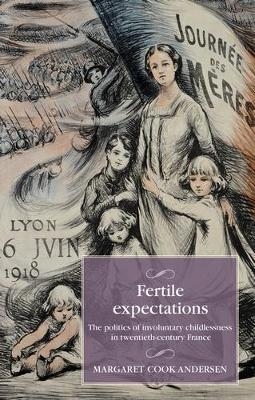
Fertile Expectations
The Politics of Involuntary Childlessness in Twentieth-Century France
Seiten
2025
Manchester University Press (Verlag)
978-1-5261-7736-0 (ISBN)
Manchester University Press (Verlag)
978-1-5261-7736-0 (ISBN)
- Noch nicht erschienen (ca. Mai 2025)
- Versandkostenfrei innerhalb Deutschlands
- Auch auf Rechnung
- Verfügbarkeit in der Filiale vor Ort prüfen
- Artikel merken
An engaging history of motherhood, demography, and infertility in twentieth-century France, this book details the fraught political and cultural meanings attached to the notion of an “ideal” family size. The author situates fertility medicine, artificial insemination by donor, and child adoption within larger concerns about the French birthrate. -- .
An engaging history of motherhood, demography, and infertility in twentieth-century France, this book explores fraught political and cultural meanings attached to the notion of an “ideal” family size. When statistics revealed a sustained drop in France’s birthrate, pronatalist activists pushed for financial benefits, propaganda, and punitive measures to counter declining fertility. Situating infertility within this history, the author details innovations in fertility medicine, cultural awareness of artificial insemination, and changing laws on child adoption. These practices offered new ways of responding to infertility and formed part of a growing expectation of being able to control one’s fertility and family size. This book presents the political and cultural context for understanding why private questions about when to start a family, how many children to have, and how to cope with involuntary childlessness, evolved and became part of state demographic policies. -- .
An engaging history of motherhood, demography, and infertility in twentieth-century France, this book explores fraught political and cultural meanings attached to the notion of an “ideal” family size. When statistics revealed a sustained drop in France’s birthrate, pronatalist activists pushed for financial benefits, propaganda, and punitive measures to counter declining fertility. Situating infertility within this history, the author details innovations in fertility medicine, cultural awareness of artificial insemination, and changing laws on child adoption. These practices offered new ways of responding to infertility and formed part of a growing expectation of being able to control one’s fertility and family size. This book presents the political and cultural context for understanding why private questions about when to start a family, how many children to have, and how to cope with involuntary childlessness, evolved and became part of state demographic policies. -- .
Margaret Andersen is an Associate Professor of History at the University of Tennessee -- .
Introduction
1: Influencing Population trends: motherhood and demographic thinking
2: Infertility in a pronatalist age: medical research and advice in the interwar period
3: Recovering Births for France: Infertility as a Pronatalist Issue
4: Adoption law reform: building families and promoting population growth
5: Gender, Nation, and the Family in the Post-War Era: Artificial Insemination in Question
6: Population growth with family planning? Demographic policy in the baby boom era
Epilogue and conclusion -- .
| Erscheint lt. Verlag | 13.5.2025 |
|---|---|
| Reihe/Serie | Studies in Modern French and Francophone History |
| Verlagsort | Manchester |
| Sprache | englisch |
| Maße | 138 x 216 mm |
| Themenwelt | Geschichte ► Allgemeine Geschichte ► Neuzeit (bis 1918) |
| Geschichte ► Teilgebiete der Geschichte ► Kulturgeschichte | |
| Medizin / Pharmazie ► Medizinische Fachgebiete ► Gynäkologie / Geburtshilfe | |
| ISBN-10 | 1-5261-7736-6 / 1526177366 |
| ISBN-13 | 978-1-5261-7736-0 / 9781526177360 |
| Zustand | Neuware |
| Haben Sie eine Frage zum Produkt? |
Mehr entdecken
aus dem Bereich
aus dem Bereich
Europa 1848/49 und der Kampf für eine neue Welt
Buch | Hardcover (2023)
DVA (Verlag)
48,00 €
Giordano Bruno - ein ketzerisches Leben
Buch | Hardcover (2024)
C.H.Beck (Verlag)
29,90 €


